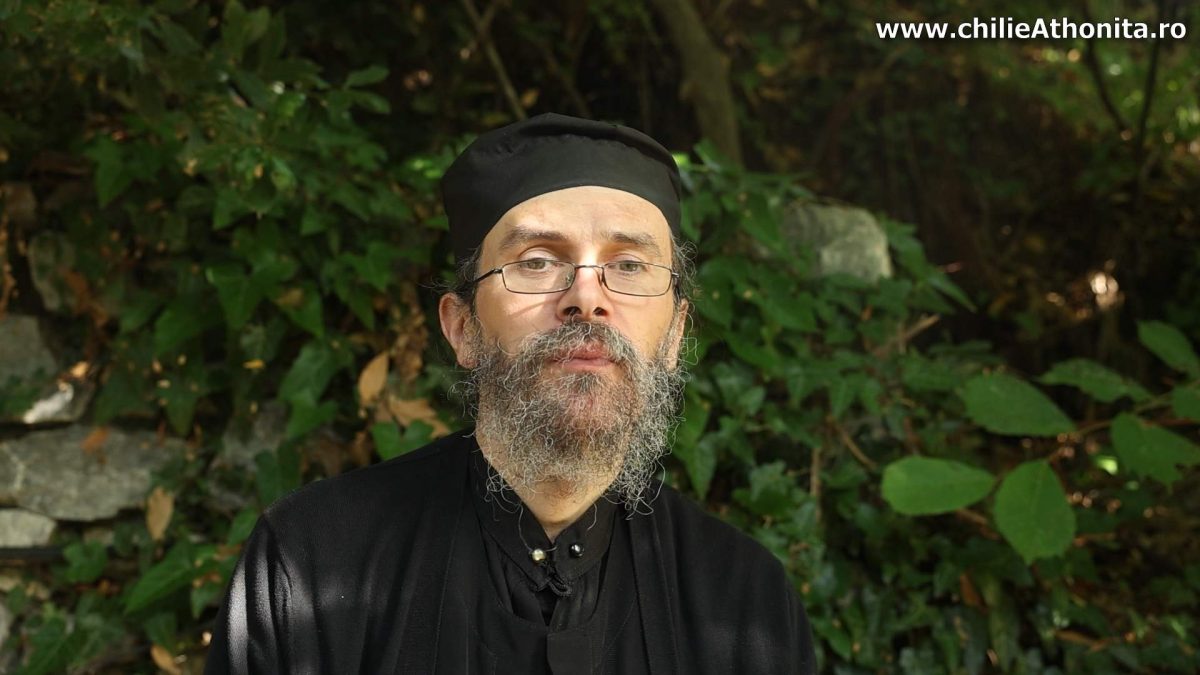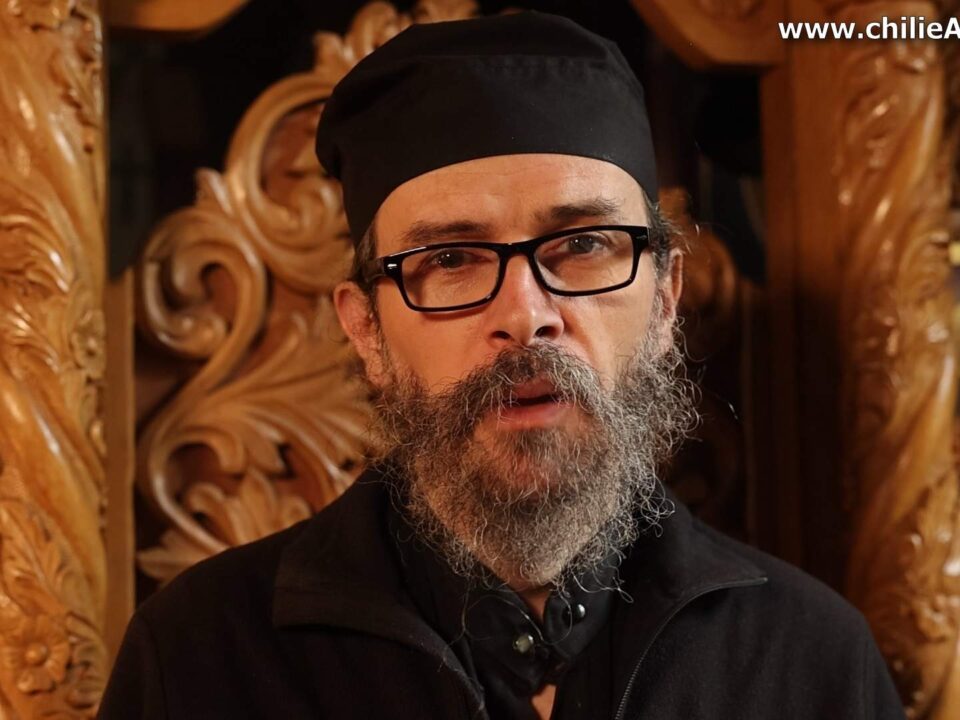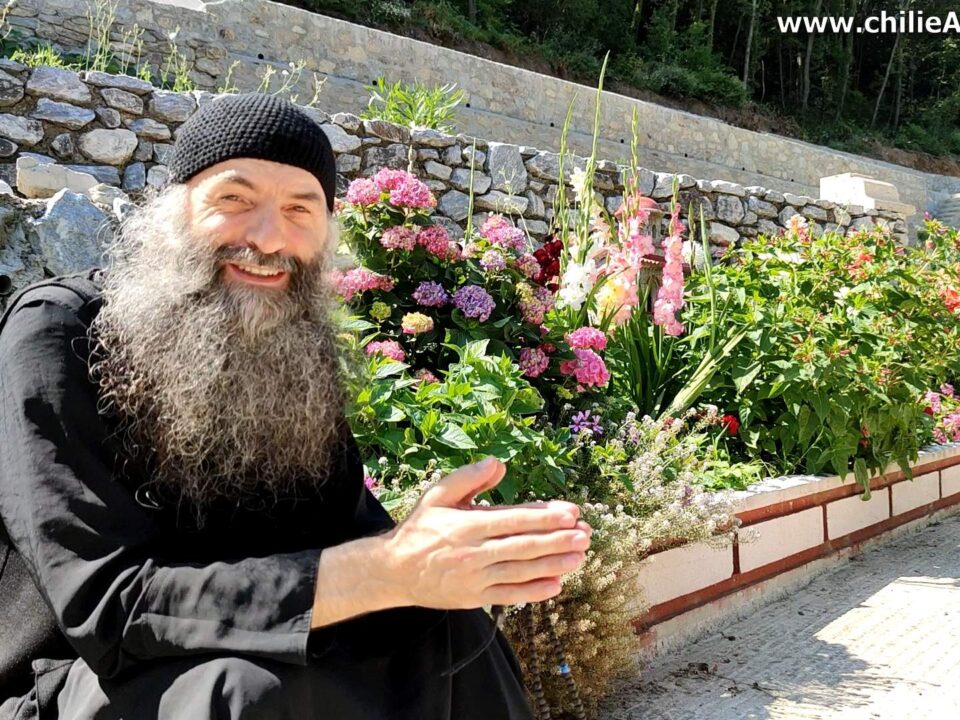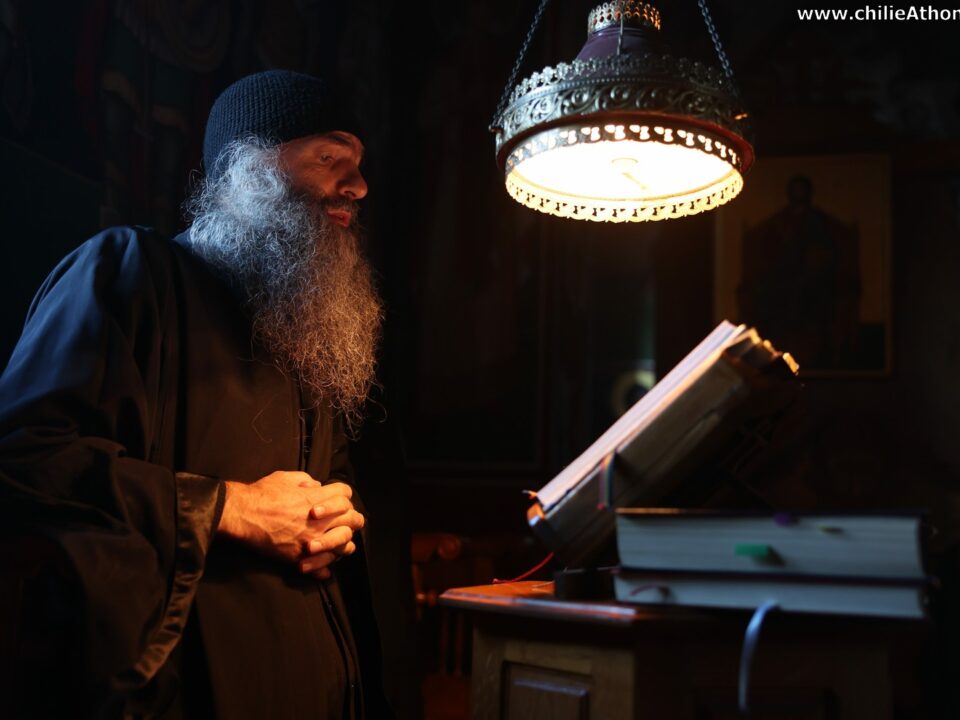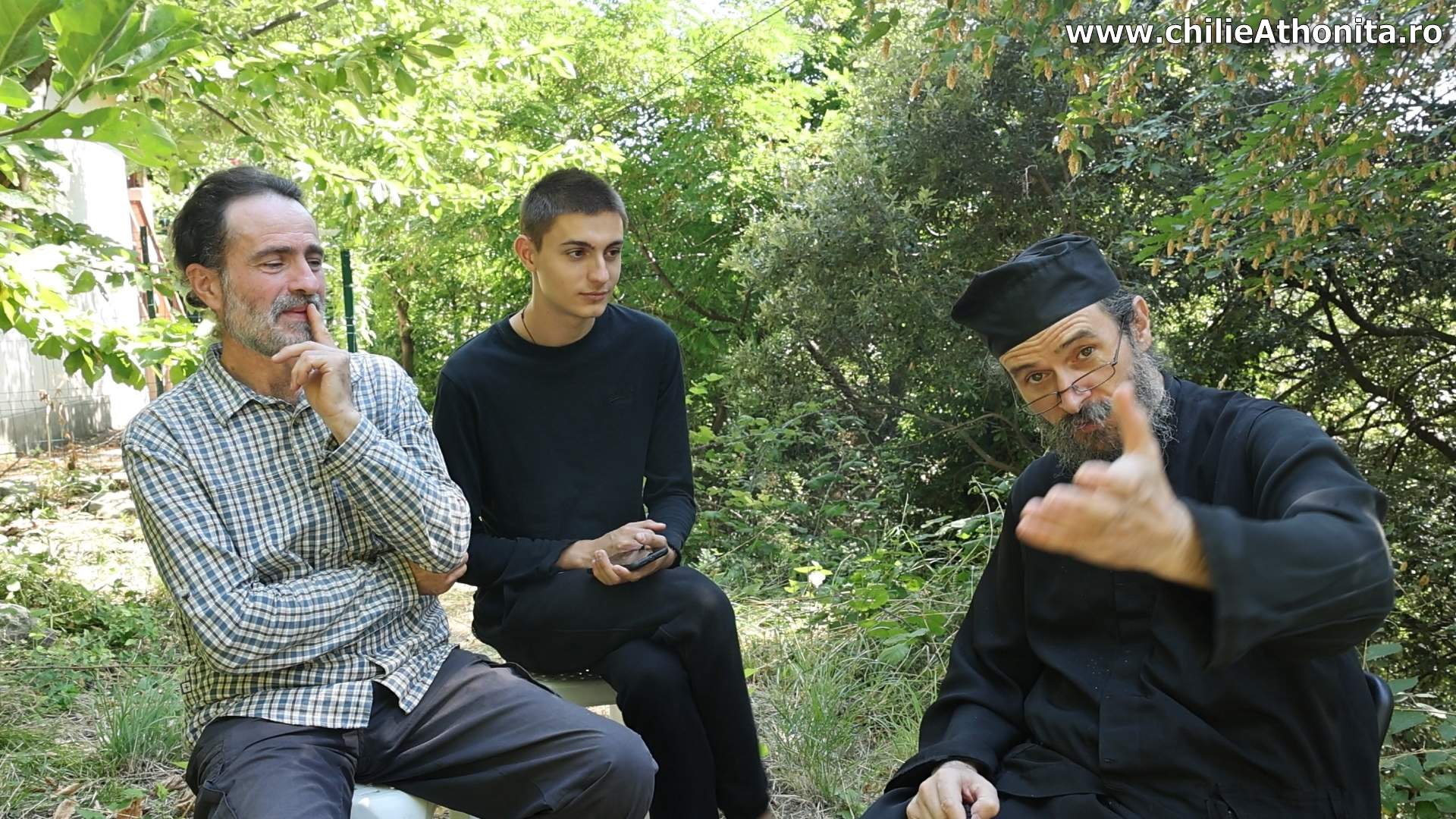
The Great Problems of Contemporary Christians – Father Theologos, Constantine and Andrew
25 September 2022
The Mercy of the Saints and the Help of the Mother of God – Father Pimen Vlad
29 September 2022How do I know God has forgiven me? Here is a question that is – or, better said, should be – in everyone’s heart. It is – or, better said, should be – at the center of our spiritual life.
We will try to answer – as much as possible – this question in this video.
Enjoy!
Glory to the Father, and to the Son, and to the Holy Spirit, now and forever and unto the ages of ages. Amen. Through the prayers of our Holy Fathers, Lord Jesus Christ, Son of God, have mercy on us! Amen.
How do I know God has forgiven me? First of all, we must know that this phrase – “God has forgiven me” – is not very correct, it is human, worldly, we use it in the absence of adequate language. We are often interested in this and aware that God does not forgive us. Brethren, this is not so, because God is always open to man, man closes himself off from God. Do you understand?
When we say that a person does not forgive, we usually mean that he closes himself off from his neighbor, it is a form of separation, therefore death. When, however, we say that God does not forgive, we understand —or, I pray, we should understand—that God remains open to man, even though man feels that a wall is between man and God, but man closes himself off from God.
Because this wall that arises between man and God is the man’s problem, it is man’s closure to God and not God’s to man. Do you understand? This wall is created by man himself through his sins and usually has pedagogical effects. However, we say that “God does not forgive me!” and that God is evil. It’s not like that, brethren, it’s not. God is not evil and is not the source of evil.
We believe God is evil because we believe ourselves to be good, and especially because we believe ourselves [to be] at the center of the universe. Not like this, brethren! God is at the center of the universe, and [we are] tiny dots somewhere in its diversity. Because of this, brethren, it is good to be humbler. So far theoretically you may know this, but from the point of view of experience you often see that we consider ourselves the center of the universe, the navel of the earth, as they say. Do you understand?
Also from lack of experience and humility, we wonder how God can allow evil. I mean, how can God allow wars, children to suffer evil and so on, all kinds of dramas, you know very well what I mean. Once again, as I said, we must be humble. God is greater than us, and therefore we cannot comprehend with our minds all the complexity of this world, and especially we cannot think in eternity because God’s “job,” God’s purpose, is to maximize human happiness in eternity, and therefore He acts according to this purpose.
Remember that St. Anthony the Great also asked God: Lord, how come so-and-so is rich and enjoying himself, so-and-so is poor and virtuous, but has nothing, the other dies young, the other dies old. And God said to him: Anthony, these are God’s judgments, and it is of no use to you to know them. Do you understand?
Yes, it doesn’t serve us to know them, but mainly, it’s about maximizing human happiness in eternity, it’s about God as the father He is for us preparing for us the best place in heaven if we want to follow Him, and this best place in heaven always involves the cross.
If our sinless Lord Jesus Christ passed through the cross, we must also pass. So a great pain now, a great cross now, even if we consider it evil, it can free from the attraction of sin which is pleasure – as we have said so many times – and this pain can give man a much greater happiness in eternity, because he will no longer be under the bondage of pleasure that held and darkened his mind. Do you understand?
Regarding those who do evil, they will of course give answer for what they do, even if, as I said, we cannot judge them as people, only their deeds, because the judgment of persons is a divine prerogative, brethren. We cannot judge.
The Lord said: “Mine is the judgment; I will judge.” Do you understand? “Mine is revenge.” Let us not take revenge, let God [do that]!
In addition, as I said, the complexity of the influencing factors, things are so complex that it exceeds the capacity, grasp and concentration of our mind and, therefore, we cannot judge even if we were allowed to do so. We don’t know who the other is, brothers. We don’t know, we have no idea. Do you understand?
God being perfectly good means that He respects the freedom of each of us, including those who do evil, even if He tries to prevent them from doing evil by any means. Of course, by any means without, however, harming the freedom of their inner universe. So He doesn’t trample on them, but He pressures them not to do evil. This tension, this pressure, this hindrance, this divine resistance is felt very acutely by the person who fights God, even though this divine pressure is good, of course.
The bitter and proud man feels it as “evil”, the stubborn one feels it as evil, because he believes that he does only good, and therefore anything and everyone who resists him, including God, is evil. All this attitude against God, against Him is counted as God’s unforgiveness, God’s harshness, allegedly, when, in fact, it is about the distortion within us, our disobedience to God’s will. Do you understand?
God’s forgiveness, then, occurs automatically the moment we turn from our way of fighting against God, from distortion because God is purely existential and totally loving. Do you understand? As soon as we repented, God immediately forgave us.
As a small parenthesis, if we confess sins, sins are forgiven at the exact moment when the prayer of absolution is read, brethren, the Canon that is given is not for the forgiveness of sins. The canon that is given is that we do not fall again. I do not wish to go into the topic of holy confession very much now. Let us return again to our struggle with God and our feeling that we are not forgiven.
The moment we have returned, [the moment] we have repented, at that moment this wall of our resistance to God, this felt “unforgiveness” disappears. Of course, a sine qua non condition is forgiveness of others because God, being purely existential and just, forgives as soon as we forgive. Doesn’t He Himself say to say: “And forgive us our trespasses as we forgive those who trespass against us”? Do you understand? So if I don’t forgive someone, neither does God forgive me. Things are very clear, but because we are pulled by our sins and our interests, we do things that we also marvel at if we take a moment to analyze them.
As you can see, things are very complex and everything depends on our openness to the good God and our freedom. How we use our freedom. How we are, brethren. “To be or not to be, that is the question,” as Shakespeare said through the mouth of Hamlet, one of his characters. Today, however, we are no longer concerned with being, but with having and doing, hence all our problems, one of which is the insensitiveness to God’s existence. We no longer think today about being, but about having, about doing. Do you understand?
If, on the one hand, we do not feel the existence of God, on the other hand, paradoxically, we feel a pseudo-sense of His wickedness. On the one hand God does not exist, but on the other hand He is evil. It’s a little absurd. Do you understand?
What is phenomenal here is that God respects our freedom of choice, of feeling. So how do we know God has forgiven us? It is obvious that this can never be certain for those who are closed to God, even partially. If we are totally open, only then do we know clearly that God has forgiven us.
What’s the opening? Humility, brethren. Humility is man’s openness to God. Humility is like the gates of a city that open wide so that the light of grace enters the stone fortress of the heart. That’s humility – the moment man puts down his walls, lowers the bridge. These were in fortresses earlier. I really like this idea of a city where man is closed before God and through humility the bridge is lowered, the door is opened.
For this reason, he who truly repents, the day when he does not weep, when he does not open himself to God, counts as a day lost, brethren, even though he has done other good things in it. None of those who do not weep forever should wait for forgiveness to be entrusted at the hour of death. For what is not shown is not certain. That is, if we do not receive revelation from God in our hearts, that is, rest, we will not be sure. No one can be sure among us who are on the path even if the Holy Spirit comforts His warriors and tells them, “Do not be afraid! You’re on your way! Courage!” Another assurance, another despair. Safety is in the good extreme, in the right limit, while despair is in the bad limit. Most of us are somewhere in the middle and we need to move forward.
Now, where is the Spirit of the Lord, the Spirit of Freedom, the Spirit of Truth who is everywhere, as it says in the prayer, apart from our hardened and closed hearts like a fortress – where it is, I said, there the bond has come undone. As he is the Spirit of Truth, the Spirit of freedom.
And where there is unparalleled humility, there is the Spirit of God because the Lord said He is meek and humble in heart. Forgiveness is gentleness, humility, freedom. That’s where it comes from, brethren. Those who go to next life without these, let them not delude themselves, brethren, as they are bound, because these three: meekness, humility and freedom are one. Do you understand?
Now, those in the world and not only, are strangers to these assurances of God’s forgiveness and especially to the presence of the Spirit. But if we grow through mercy, then we will know the benefit of this gracious state at the hour of our exit from the body. We must be merciful, brethren. Mercy brings freedom and meekness and humility.
Because of this, we have to cry for ourselves and be focused like the pilot of an airplane who has to maneuver his aircraft to pass between two nearby cliffs and takes off in the right direction. That’s how focused we have to be to see the target ahead like the rifleman who sees the target ahead. This is how focused we must be, brethren, on our death, on our take-off from this world.
Just as the pilot focuses on his handle, on the dashboard, on the steering of the plane, on what he has in front of him and not on all kinds of things happening around, especially if the cliffs in front are approaching – if take-off is approaching, if death is approaching – so the one who repents and cries for himself – and does not deal with what is happening all around, what others are doing, other people’s failures – real or not, news and all sorts of things like that. If we are not careful about our road ahead, then we will crash into the cliffs with great speed and we will be smashed.
This attention allows us to use our anger against sin correctly—to get angry at the causes of sin and avoid them—not people, but the causes. Let’s get away from them as quickly as possible and keep our schedule and watchfulness, [our] clarity of mind.
On the other hand, the attention that comes from this watchfulness and clarity of mind allows us to use desire as well, that is, the will. If we spoke of the incensive part, now we speak of the desire side, the will, love. With this we must love our Savior and other people, everyone, and this in order to be humble. This is because the sign of forgiveness of the fall is that we always consider ourselves sinners, always in debt, and on the other hand that we hate passions. So on the one hand we feel humble, loving of others, we feel longing for Christ, on the other hand, with the incensive/anger side, we hate passions.
If we hate our passions, then we have got rid of them. If we don’t hate our passions, we haven’t gotten rid of them. Do you understand? Because passions mean pleasure. If we are grateful, we receive grace. If we are not grateful, we do not receive grace. Very clear, very simple, brethren. Gratitude is the key to grace. Saint John Climacus talks about it, St. Joseph the Hesychast talks about it and many other fathers talk about it. Even St. Joseph the Hesychast says that the key to grace is gratitude.
We reach the maximum of forgiveness when we have a clear conscience, when nothing rebukes us, especially during prayer, and this is because, brethren, especially then the devil seeks to fight us and defile our prayer, blaming us. Do you understand?
Of course, sometimes when the accusation is gentler and constructive, that is, the qualms of conscience come from God, through the enlightenment provoked by prayer and through the mercy of God who, like a loving father, draws our attention that we have something to correct.
If our conscience does not rebuke us for anything, then we are well, but beware, as St. Paul said that “to him who seems to stand should take care not to fall.” On the other hand, let us be careful not to have qualms of conscience not because of purity, but because of too much sinful filth, too many sins covering the conscience. I mean because of callousness, brethren!
Callousness is a great, great scourge and must be avoided at all costs because it is the tombstone. In order not to get there, we must fight the passions when they are small, because if they grow up, then they cover the voice of consciousness like thick dross and consciousness is no longer heard. Consciousness is like a tape recorder that goes on continuously, but being covered by passions, it is no longer heard.
I told you before, remember, Abba Dorotheus gave an example that I mentioned before: of a disciple who was made to pull larger and larger plants out of the ground until he could no longer remove them on his own, symbolizing the fact that passions are more easily unraveled when they are small. The habit when it is established becomes second nature, as St. Basil the Great says and if it’s a bad one, it takes blood and time to get it out of there.
But, brethren, nothing is like God’s mercy. Grace is almighty. He who despairs has killed himself. I’ve said that and I’ll say it again. So don’t think God doesn’t forgive us. Everything depends on us, in a final analysis – on our attention, which generates the purity of thoughts. But how can we have purity in our thoughts when they are constantly filled with all kinds of things that are more or less attractive from a worldly point of view and we try every minute to switch our attention elsewhere for intense stimuli of attention, of pleasure? Now this, that, TikTok, news, Instagram and so on.
Our thinking today, instead of being predominantly linear, contemplative, quiet, is massively parallel, chaotic, jumping from one to another in extreme superficiality without delving into the meaning of things. TikTok and related networks (there are others) are powerful expressions of this way of thinking. In fact, most of our life is no longer spent solving problems, but jumping from one side to another. Do you understand?
So we don’t spend our time solving problems, using things, and loving people, but jumping chaotically from one to another. Do you understand? This disease of human thought must stop. We must control ourselves and stop, brethren. Let’s lessen our worries and addiction to dopamine, to excitement. Otherwise we will not find God’s will and therefore, implicitly, forgiveness. Do you understand?
We find forgiveness and God’s will when we have peace of mind, when love for God and for our neighbor grows within us, and when hatred for passions grows in us, without being troubled and without this hatred appearing before divine love, without disturbing it, without drowning love, Understand?
Then we find God’s forgiveness and will – when we unite through love with God and others, brethren. Of course, this union is made, as I have said before, through the forgiveness of others. We must forgive in turn if we want to be forgiven.
We do not learn God’s will from the stars, brethren. Astrology, the zodiac, the signs used in this sense are satanic, brethren. Man does well when people validated by God in the Church, spiritual people, tell him this, and he himself feels God’s love, he feels “when he is forgiven” and not when the zodiac tells him or I don’t know what medium, fortune teller or astrologer. Do you understand?
Our desire for magic, sensationalism, even salvation, truth and forgiveness without effort, that is, to save ourselves “by pressing a button” as they say, is exploited by the enemy who offers us a lot of means to catch us in the net. Lovers of pleasure easily turn to such things, not knowing that every sin, every sinful pleasure is brought out through analogous pain. Not through clicks, brethren.
The planets and stars, trees, talismans and so on, these are rocks or fireballs and gas, they are God’s creation. This does not influence the person who is free in the image and likeness of God. In fact, a stone does not influence the human person even if it is in front of us, if, of course, it is not bewitched, or if it does not provoke passions, mainly the passion of greed. Meaning: I want to have that stone, in this case, gold, usually, or I don’t know what other precious metal – platinum, lithium and so on.
Now you’re going to ask me where all this fuss about the zodiac and planets started. Well, let me tell you. The zodiac, brethren, the name comes from the sign, meaning it is about 12 constellations which, according to St. John of Damascus, were indeed signs of wind and water. That is, in the past, people had no way to measure time and what they’d do – they saw that the sun disappears in a certain constellation. Those were the months.
Well, and then, even in the older horologions it says that the sign of Sagittarius is [for] the time to gather your bees, stomp on your grapes and so on. And then, charlatans and those hungry for fame or money say yes, since it influences as a weather forecast – you have to stomp on your grapes – it means that it also influences your personality. It doesn’t influence personality! No way! They were just such coarse signs of probable time. I mean, it was so-and-so month. Because at that time there were neither clocks nor anything, and then the elders looked at the sky and saw that the sun was disappearing in that direction. Do you understand?
The devil, of course, helps here because he wraps them up nicely with all kinds of attractive words starting from science – words like “quantum”, “bioenergy”, “astral” and so on, and all these words that tickle the hearing, and even in the spiritual sphere where the names of God, the Mother of God are invoked, candles, icons, Bibles, all that. You must know that the devil knows a lot because he can deduce. He does not have the gift of clairvoyance, but he can deduce things based on his experience and, being a spirit, he knows what people want, he sees what is far away – he travels fast, so to speak. Do you understand? And because of this, some may be clairvoyants, not from God, but from the devil.
Beyond that, if his man – that is, a medium or a sorcerer – says something that is not very useful to the soul, then the enemy can partially or even totally accomplish it. To subjugate and make a follower of the one who goes to the medium. Great care, brethren!
Let me give you a case. In the time of St. Theophanes the Recluse, there was a great witch and everyone went to her and was impressed that she was clairvoyant and so on. And St. Theophanes says, “You should be careful because she is a witch!” And people said, “No, Your Grace!” As St. Theophanes was a bishop.
“No, Your Grace, she knows things and reveals them to us, and so on.”
“Careful, she’s a witch!” And finally they found out that she was a witch and they all went to the Elder and prostrated and said: “Your Grace, how did you know?” And he said:
“How do I know? All the things this woman said, which were really very impressive, were of no benefit.” Do you understand? Great attention [is needed]!
There are also people who are clairvoyants in the Church, but they, brethren, are first validated by the flock of the Church and have exemplary spiritual behavior beforehand. The clairvoyant does not appear on the tram.
Brethren, this is not how we find God’s will, this is not how we find forgiveness from God, this is not how we reach perfection. On the contrary! This is how we distance ourselves from God, this is how we feel bitterness, anxiety, turmoil, passion within us, which we cover with smiles and more or less chosen words. We reach perfection, union with God, forgiveness by denying our will and our sinful passions.
It takes struggle, brethren, prayer, courage, love, openness to others, forgiveness of others and not magic – even white magic – because white magic does not exist.
May the good Lord help us to have the courage to forgive so that we may be forgiven too! May the good God help us! Through the prayers of our Holy Fathers, Lord Jesus Christ, Son of God, have mercy on us! Amen.
Pomelnice online și donații
Doamne ajută!
Dacă aveți un card și doriți să trimiteți pomelnice online și donații folosind cardul dumneavoastră, sau/și să susțineți activitatea noastră filantropică, inclusiv acest site, vă rugăm să introduceți datele necesare mai jos pentru a face o mică donație. Forma este sigură – procesatorul de carduri este Stripe – leader mondial în acest domeniu. Nu colectăm datele dvs. personale.
Dacă nu aveți card sau nu doriți să-l folosiți, accesați Pagina de donații și Pomelnice online .
Ne rugăm pentru cei dragi ai dumneavoastră! (vă rugăm nu introduceți detalii neesențiale precum dorințe, grade de rudenie, introduceri etc. Treceți DOAR numele!)
Mai ales pentru pomelnicele recurente, vă rugăm să păstrați pomelnicele sub 20 de nume. Dacă puneți un membru al familiei, noi adăugăm „și familiile lor”.
Dumnezeu să vă răsplătească dragostea!


